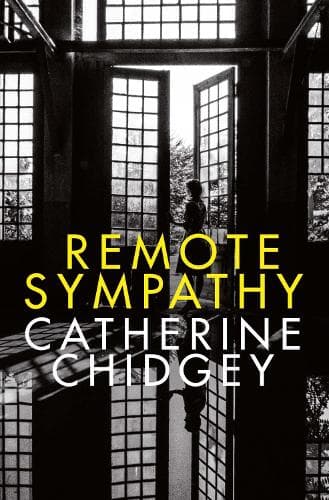Review: Remote Sympathy
Reviewed by Paula Green
Catherine Chidgey’s The Wish Child, the Acorn Foundation Fiction Prize winner at the 2017 Ockham New Zealand Book Awards, is set in Berlin amid the horrific circumstances of WWII. I rated the book an unmissable reading experience, with its exquisite craft and heart-moving themes. Chidgey’s new book, Remote Sympathy, also set in WWII, is equally remarkable.
The narrative takes place in Weimar and Buchenwald, the neighbouring Nazi concentration camp, where Frau Greta Hahn’s husband, SS Sturmbannführer Dietrich Hahn, is the administrator. When Frau Hahn’s life is threatened by cancer, her desperate husband arranges for Dr Lenard Weber to be moved to the camp, along with his alleged cancer cure, a Sympathetic Vitaliser machine. Dr Weber hypothosised that the cure as well as the disease could pass through a body by means of remote sympathy. However, his marriage to Anna thwarted any progress beyond an initial small trial. In order to protect his Jewish wife and child, he got a divorce and kept them out of reach.
The story unfolds through four diverse points of view: Greta’s imaginary diary, the corrupted tapes of Dietrich’s post-war interview, letters Lenard writes to his daughter Lotte and the private reflections of 1000 Weimar residents. The accruing and unbearable layers of sadness are located in the inhumanity of the concentration camp, the habit of looking away and not acknowledging the unspeakable crimes, the sacrifice individuals make to protect family, the little gestures of humaneness.
The heart-busting sadness you feel for a people is heightened by the border between ordinary life and the excruciating disregard for human existence.
Greta moved from a lovely Munich apartment with her husband and son and now wants to recreate a family home. She can have anything she desires; skilled craftsmen will produce anything she wants. Yet the camp is on the periphery of her vision, something to shield her son from, something to threaten her sense of security, something to remain unnamed.
There is an order of things to be upheld. The Jewish servant will wipe the plates, the Jewish prisoner will spread the shit and live off decreasing rations, the Jewish doctor must never look his patient in the eye. But Greta is also part of the order of things and that adds to the complex grief I felt as I read. She is, perhaps, incapable of treating her servant or the doctor with her husband’s belittling disdain. Yet she also has her place. Her husband keeps the word ‘cancer’ from her. She has no say in the prescribed medication, surgery she will or won’t have, how she might manage her life-threatening illness. She relinquished her Catholicism and the comfort of her Bible upon her marriage.
Doctor Lenard’s letters, like Greta’s diary, draw the reader into a history that is both complicated and corrupt. He will do almost anything to save his skin. He will manufacture the dimensions of hope and yet, through him, we are offered a narrative twist and the glint of hope that is one of the book’s miracles. I am not saying any more; you must feel the effects of this book for yourself.
At a time when I am compelled to read books of the utmost comfort, venturing into the light and dark of Remote Sympathy felt like an added risk to my unsettled state of mind but this astonishing book, with its inextricable braid of sadness and determination, is exactly what I needed. Chidgey is a silversmith with words, she forces us to face and review our relations with humanity, head and heart on. This is exactly the book we need now.
Reviewed by Paula Green
